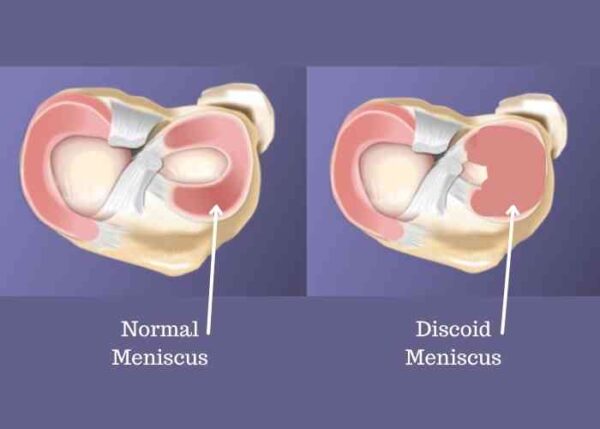What is Discoid Meniscus?
The knee has two C-shaped fibrous cartilages, called menisci that conform to the surface of the bones and act as shock absorbers within the knee joint. The lateral meniscus is located on the outside of the knee, while the medial meniscus is located on the inside of the knee. If either of these menisci are abnormally shaped, it is called discoid meniscus. A discoid meniscus is much larger than a normal meniscus. It is often pancake-shaped rather than C-shaped. Ironically, its increased size and irregular shape is not a good thing and makes the meniscus susceptible to tearing. Often time these tears can be severe and result in meniscus deficiency.

How rare is discoid meniscus?
Discoid meniscus most often involves the lateral meniscus and occurs in less than 1% of patients in North America. In Asian countries the number can be as high as 5%. Due to the rarity of this condition it is important to consult with Dr. Armando Vidal, orthopedic knee specialist, serving patients in Vail, Aspen and the surrounding Denver, Colorado communities. Dr. Vidal understands the condition and has been treating discoid meniscus successfully along with his colleges at The Steadman Clinic.
What causes discoid meniscus?
The precise cause of discoid meniscus is unknown, though there are some theories. The most accepted theory is it is a congenital disorder since most patients are born with discoid meniscus. Most patients do not experience symptoms until they participate in sports or other activities and the meniscus tears. Although most patients present with symptoms in adolescence, they can remain asymptomatic or silent for a patient’s entire life or can present in adulthood. We do not treat discoid menisci that are asymptomatic or that are found incidentally. MRI is the gold standard for making the diagnosis. Dr. Vidal can help you understand the significance of this finding on your MRI and treatment options. Meniscal preservation, particularly on the lateral side, is key to maintaining normal knee function and avoiding a meniscal deficient state.
Are there different kinds of discoid meniscus?
20% of patients who have a discoid meniscus have it in both knees. It is separated into three types:
- Incomplete – The meniscus is slightly thicker and wider than normal, usually asymptomatic.
- Complete – The meniscus covers the tibia (shinbone) completely.
- Hypermobile Wrisberg – The meniscus is not attached to the femur or the tibia due to missing ligaments. Can cause the meniscus to slip into the joint causing locking, popping and pain.
What are symptoms of discoid meniscus?
Individuals with discoid meniscus can be asymptomatic for years and never know of the cartilage abnormality. Most patients present with symptoms in childhood. Patients having problems however often report the following symptoms:
- Lateral joint pain
- A clicking or popping sound in the knee
- Grinding sensation or sound on the outside of the knee
- Sharp or stabbing pain when running, jumping or deep squatting.
- Swelling in the knee
- Stiffness and loss of range of motion
- Catching or locking – the knee “gets stuck” when fully bending or straightening
How is discoid meniscus diagnosed?
An X-ray is often the first indicator of a malformed cartilage, allowing Dr. Vidal to see variations in the knee joint such as a widened lateral joint space. Flatter than normal bones or squaring of the lateral femoral condyle is also a good indication seen in simple x-rays. Dr. Vidal will confirm the diagnosis with an MRI scan which helps him to more clearly define the exact shape of the meniscus as well as where it may be torn or injured.
It is important to note the MRI can show the abnormal shape of the discoid meniscus, as well as tears within the meniscus. However, the rare Wrisberg type of discoid meniscus cannot be detected with an MRI because the problem only occurs when the patient is moving. For this reason, it is important to consult with a physician like Dr. Vidal who has experience in diagnosing and treating a Wrisberg discoid meniscus.
Complex Knee Specialist
Have you experienced a decreased range of motion in the knee, clicking or popping sounds, and swelling? If so, you may be experiencing a discoid meniscus. A discoid meniscus is enlarged and can cause great pain. This condition is rare, so it is important to seek out a specialist if you believe you are experiencing discoid meniscus. Complex knee specialist, Doctor Armando Vidal is well-versed in diagnosing and treating patients in Vail, Aspen, and the surrounding Denver, Colorado communities who are experiencing discoid meniscus. Contact Dr. Vidal’s team today!

Locations
180 S Frontage Rd W
Vail, CO 81657
226 Lusher Court
Ste 101
Frisco, CO 80443
322 Beard Creek Road
Edwards, CO 81632


